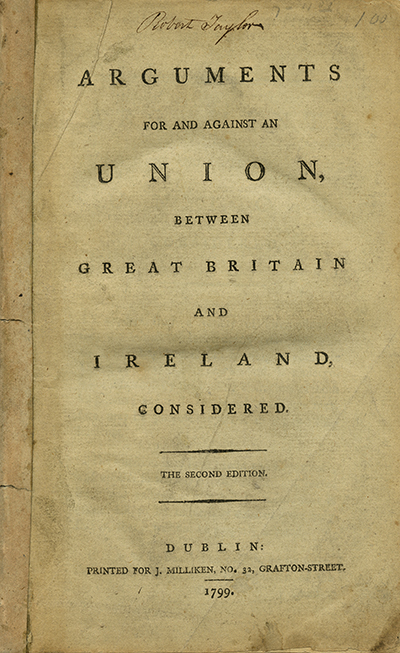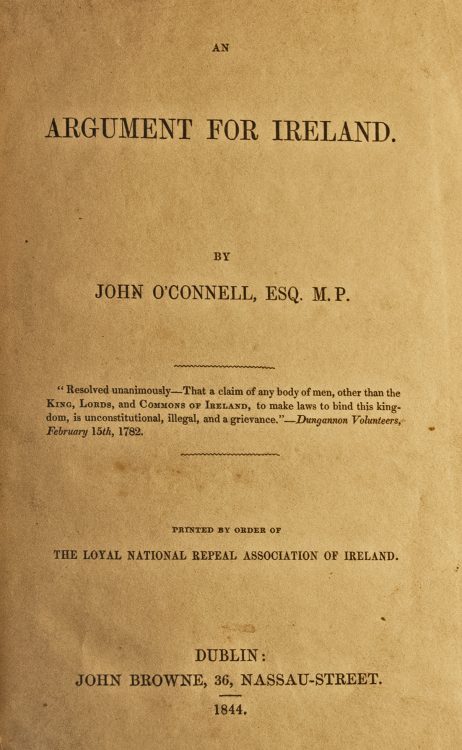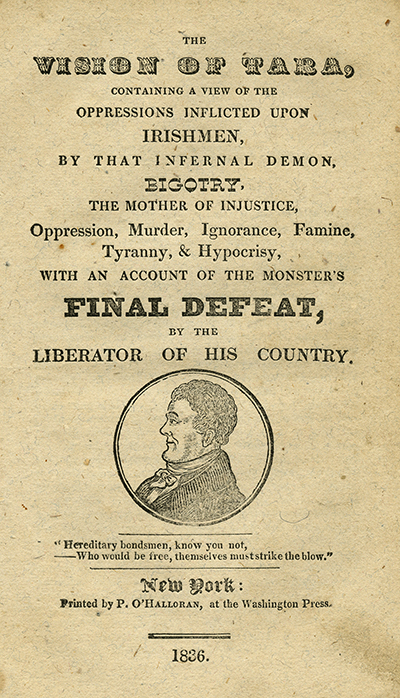Cooke, Edward and John Milliken. Arguments for and against an union, between Great Britiain and Ireland, considered. Dublin: Printed for J. Milliken, no. 32 Grafton-Street, 1799.
Edward Cooke was an English government official in Ireland and a well-known political pamphleteer. Cooke was very pro-union, writing that the arrangement would be of benefit to both countries and would bring about more political relief for Catholics, who were still under the Penal Laws. Union would bring Ireland safely into the fold of the British Empire, “making her power the power of Great Britain, and the power of Great Britain her own.” Writing shortly after the 1798 Rebellion, Cooke importunes his readers that resisting union “would make Ireland the scene of contest in Europe; would deluge her with blood; would reduce her to desolation.”
O’Connell, John. An argument for Ireland. Dublin: J. Browne, 1844.
One of seven children of the Liberator Daniel O’Connell, John O’Connell (1810-1858) was a leader of the Loyal National Repeal Association of Ireland. The Repeal Association was established by Daniel O’Connell in 1840 to reinstate the Irish Parliament with full Catholic participation, which the 1800 Act of Union denied. In this treatise, John O’Connell argues that Ireland is far more poor than England, whose “unjust restriction in commerce and manufactures, and the blighting influence upon industry of the country, of the penal laws...shut off the majority of the people from profitable enterprize [sic] and employment.” O’Connell noted “a further cause of exhaustion and misery in the unchecked, or rather accelerated, progress of absenteeism.” These issues would only grow worse in the years of the Great Famine.
The vision of Tara: containing a view of the oppressions inflicted upon Irishmen, by that infernal demon, bigotry, the mother of injustice, oppression, murder, ignorance, famine, tyranny & hypocrisy: with an account of the monster’s final defeat by the liberator of his country. New York: Printed by P. O’Halloran, 1836.
The Hill of Tara (Cnoc na Teamhrach) was the seat of the High Kings of Ireland, a political and sacred site dating back to the Neolithic Period. In 1843, Daniel O’Connell convened a great meeting at Tara to campaign for the repeal of the 1800 Act of Union. It was the largest of the “monster meetings” held around the country at significant Celtic sites, during which massive crowds gathered in non-violent protest. It is considered the largest gathering ever held in Ireland—estimates numbered some 750,000 people.
These monster meetings did not go unnoticed by the British government, which deemed them dangerous and banned O’Connell from holding the next at Clontarf, where, during the Battle of Clontarf in 1014, High King of Ireland Brian Boru defeated the Vikings of Dublin and Leinster. O’Connell agreed and called off the meeting to avoid any bloodshed, but without the political leverage of the monster meetings, the campaign petered out with O’Connell’s failing health after a stint in prison for the meetings and division within the Repeal Association.




